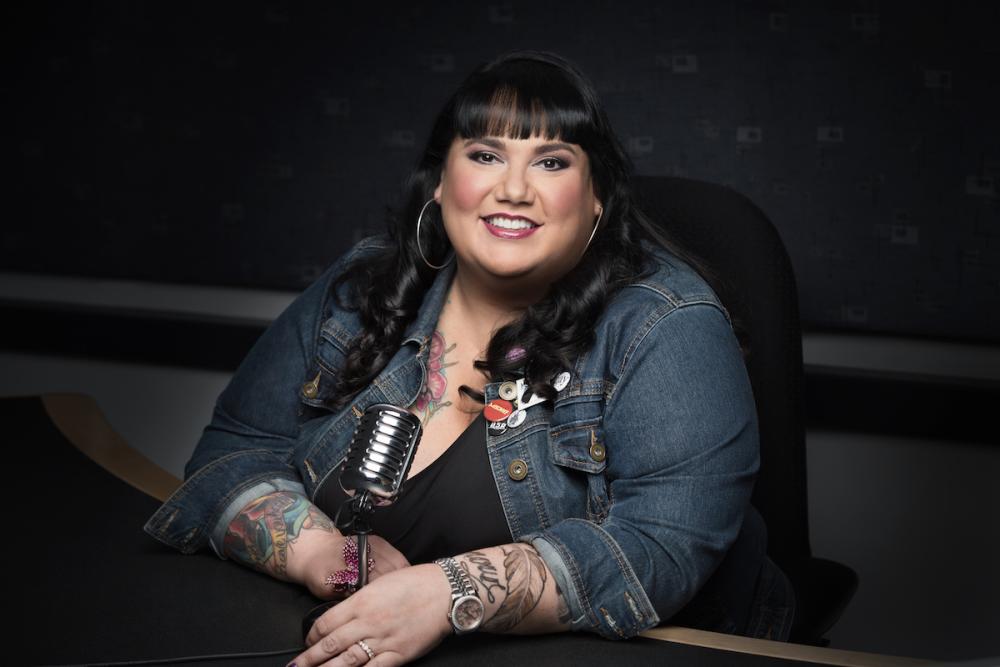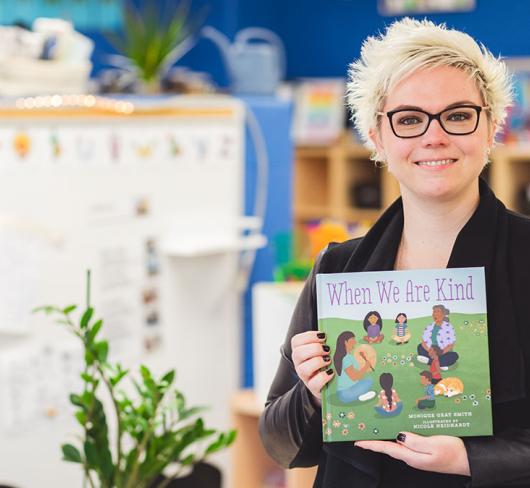
Making a Difference from Where You Are
VOICE: You spoke at last year’s ETFO annual meeting. What was the message you wanted to convey to the educators gathered there?
CANDY PALMATER: Educators have the ability to influence and shape the minds and lives of their students. At the same time, however, they are under tremendous pressure. I wanted to validate the work they do while trying to convince them that they deserved a lot of love and attention. When I speak at a conference, if I can convince even one person to embark on the challenging work of truly loving themselves, I consider it a success. We need educators so badly. We don’t need them to be perfect, we only need them to be persistent. And we need them to take good care of themselves, because they hold the future in their capable hands.
VOICE: You have spoken about the powerful impact that educators have had on you over the course of your life. What were the gifts these teachers provided to you?
CANDY: As I answer this question, I am in a hotel room in the middle of a road trip from Toronto to my home on the north shore of New Brunswick. I am traveling home to attend my high school principal’s 85th birthday party. He was an educator and mentor to me in high school and has become a lifelong friend. His friendship is a great gift. Beyond just the joy of the relationships, my educators taught me how to problem solve, they helped me find the things that really interested me, like books, sports and politics. They showed me how smart I was and they helped me figure out the things I was really good at. Most importantly, they gave me the tools I needed to go out into the world and do hard things!
Voice: The Conservative government here in Ontario is making damaging changes to public education, including cancelling the Indigenous education curriculum writing that was a response to the Truth and Reconciliation Commission. How can educators and others committed to social justice be good allies to one another?
CANDY: When we chose to base our practices, or indeed our lives, on certain principles, no change in government can affect that. Value-based living means that my work comes from a place of love and reconciliation regardless of the environment I am in or the changing circumstances. Circumstances will always change. The only way we can continue to be allies to one another is by being sure of who we are, loving ourselves and then passing that love on to one another. Be sure of your values and then let those values inform all your choices.
VOICE: You have spoken about the importance of humour, particularly as a strategy for coping with trauma and healing. Can you talk about how you have used humour as a strategy to empower the communities you are a part of?
CANDY: When Stephen Harper delivered the apology to the residential school survivors, there was a gathering organized in Moncton, NB, for the East Coast survivors. They would be coming together with government officials in order to recount their stories of abuse. I was called to do comedy on the final night of the gathering. I declined, thinking it wasn’t a good fit. But then one of the elders told me that humour is how we, the Mi’kmaq, survived all these years and if that was the gift I was given, that was what I owed. I went to Moncton and performed a powerful set. Afterward I was showered with praise by the survivors, each of them whispering into my ear how long they had been at residential school. I got in the car and started to cry and I don’t think I stopped until we were back home. That night in bed, I turned to my wife and said, “I just learned how serious this funny business is.”
VOICE: This issue of Voice is our women’s issue and representative of ETFO’s commitment to empowering women members in the organization. What message do you have for the women educators who are reading this? How have women role models empowered you on your journey? How have you done the same for other women?
CANDY: My mother was my greatest influence. She never worked outside the home and didn’t have a driver’s licence, but my mother knew who she was. She had values that she lived her life by. She showed me love and tenderness by her actions toward me. In simply living her life, she showed me, by her example, honesty, integrity, generosity and strength of character.
I remember so clearly, the first older woman I knew who worked outside the home. She was my sister-in-law’s mother, Anastasia Mac-Sween from New Waterford, Cape Breton. She was a nurse. I adopted her as my grandmother. I didn’t know any other women, born in the twenties, who were financially independent.
When I was in elementary school, I was friends with two sisters. Their mother, Beaulah Frenette, was what we would now call a plus size woman, a term not heard of back in the early seventies. She was a real estate agent and a political mover and shaker and she was always dressed impeccably. I remember great lipstick and flashy scarves. Her husband adored her and it was clear that she was the boss, at home and at work. She drove a huge Lincoln Continental and she wore high heels and jeans. Jeans! There were no plus size jeans in existence in the early seventies in our neck of the woods. If you were bigger than size 16, it was polyester pants for you. I don’t know where she went to get her amazing clothes, but her confidence left a lasting impression.
When I was 16, I got my first summer job working for the Canada Employment Centre in Dalhousie, NB. It was 1984 and the boss in this small office was a woman named Denise Bernard. I knew she was single and one day she came to work with beautiful diamond earrings. I complimented them and asked who gave them to her. She smiled at me and said, “oh, I bought them for myself.” Wow, I thought, you can be successful enough to buy yourself diamonds? A woman can be a boss? AND not have to wait for some man to buy you diamonds?! I knew I wanted to be the kind of woman who could buy my own diamonds (literally and metaphorically). I ran into Denise just a few years ago in an airport and told her that story. She, now retired, was thrilled to hear that she had influenced me.
As an adult, I have met and worked with many famous and dynamic women: writers, actors, musicians, politicians, etc. But I intentionally wanted to mention these four small town women who in their limited spheres, at a time when it was not yet accepted, never mind celebrated, liberated themselves, and by their simple presence, in turn, liberated me.
We don’t need to do grand things. Each of us, right from where we are, can do our part. We owe it to all the women who didn’t make it, who never got to vote, or hold property or be citizens. We owe it to them to love ourselves, to daily liberate ourselves and to let our light shine. I do that every day, in the hope that my liberation will, in turn, liberate those around me.
With contributions from Rachel Mishenene and Izida Zorde, ETFO Executive Staff.

